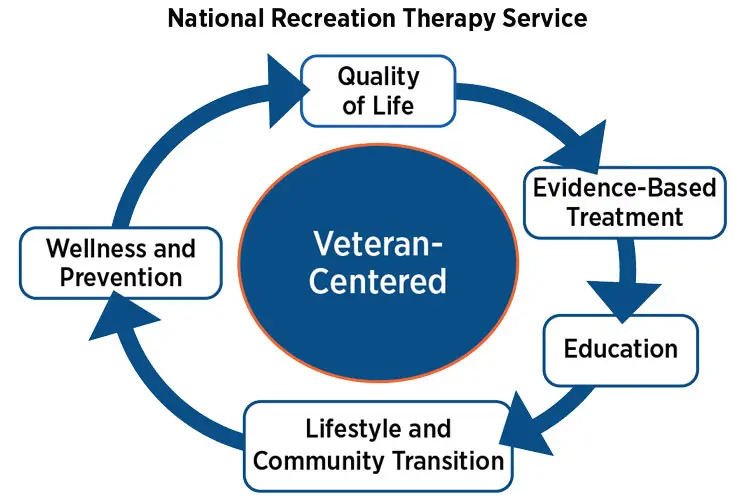Recreational Therapy for Servicemembers, Veterans Enhances Quality of Life
By Ms. Michelle Piehl, Staff Writer
When servicemembers experience illness or injury, it can lead to a wide array of thoughts, feelings, and experiences. Some even experience a sense of loss of community or purpose. The evidence-based concept of recreation therapy has led to gains for servicemembers and veterans in helping restore quality of life.
As the first national healthcare system to establish a recreation therapy program, originally established under the Rehabilitation Medicine Service Office, the Veterans Health Administration helps veterans and servicemembers connect to various programs, such as creative arts, adaptive sports, outdoor recreation, animal-assisted, and fitness and wellness therapies. Now a standalone service within the U.S. Department of Veterans Affairs (VA), recreation therapy uses a multidisciplinary approach to maintaining health and wellness for veterans with injuries, chronic illness, or disabling conditions, allowing them to stay engaged with their families and communities.
The American Therapeutic Recreation Association defines recreational therapists as “healthcare providers who plan, direct, deliver, and evaluate recreation-based interventions for individuals with illnesses and/or disabling conditions. They provide research-informed interventions that are based on client assessments and targeted client outcomes.”[1]
Relaxation techniques, animal visits, adaptive sports, aquatic therapy, comfort-based activities, and drama, art, dance, and music therapy programs help equip servicemembers to manage the difficulties associated with various physical and mental conditions. These programs offer numerous ways for veterans to connect with thoughts, feelings, experiences, and other socioemotional domains.
Adaptive sports provide community, connection, and independence to enhance the quality of life for servicemembers and veterans. The Department of Defense (DoD) Warrior Games is an adaptive sports competition for wounded, ill, and injured active duty servicemembers and veterans.
“The adaptive sports featured in the DoD Warrior Games are a part of the larger DoD Warrior Care program. Within this program, adaptive sports provide reconditioning activities and competitive athletic opportunities to all wounded, ill, and injured service members to improve their physical and mental wellness throughout the continuum of recovery and transition. Modified equipment and additional classification systems allow each athlete to compete, regardless of their injury or illness,” states the DoD Warrior Games website.[2]
VA offers several programs, including the National Veterans Wheelchair Games, National Disabled Veterans Golf Clinic, National Veterans Golden Age Games, National Veterans Creative Arts Festival, National Disabled Veterans Winter and Summer Sports Clinics, Adaptive Sports Grant Program, and monthly training allowance for veterans who are Paralympic or Olympic sport athletes. “The capacity to enjoy life and to maintain self-esteem is vital to the wellbeing of an individual particularly when recovery or adjustment is involved. Based on a core knowledge of human behavior and physiology, the goal of recreation therapy and the creative arts therapies is to creatively develop an individual’s potential for self-sufficiency, enrichment, and fulfillment,” states VA.[3]
[1] ATRA. n.d. “Who We Are.” https://www.atra-online.com/who-we-are.
[2] United States Marine Corps. 2024. 2024 Department of Defense (DoD) Warrior Games. https://www.woundedwarrior.marines.mil/2024WG/.
[3] U.S. Department of Veterans Affairs. n.d. “Why Creative Arts Therapy?” https://www.rehab.va.gov/PROSTHETICS/rectherapy/Why_Creative_Arts_Therapy.asp.

